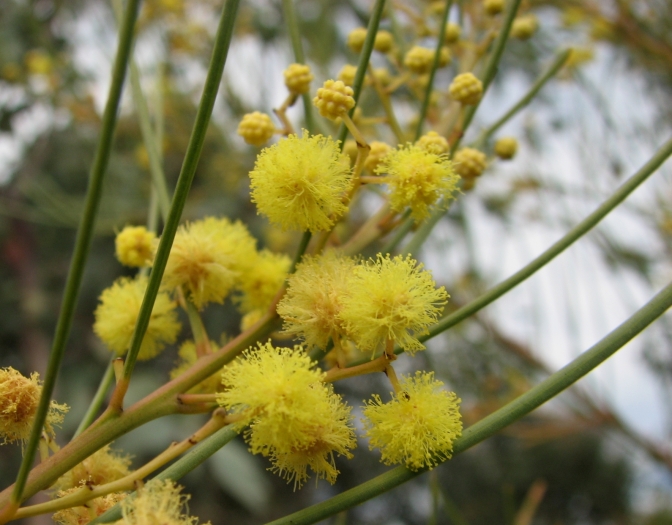Awl-Leaf Wattle
(Acacia subulata)
Awl-Leaf Wattle (Acacia subulata)
/
/

Melburnian
CC BY-SA 3.0
Image By:
Melburnian
Recorded By:
Copyright:
CC BY-SA 3.0
Copyright Notice:
Photo by: Melburnian | License Type: CC BY-SA 3.0 | License URL: https://creativecommons.org/licenses/by-sa/3.0 | Uploader: Melburnian | Publisher: Wikimedia Commons | Title: Acacia_subulata.jpg | Notes: |



















Estimated Native Range
Summary
Acacia subulata, commonly known as Awl-Leaf Wattle, is an evergreen shrub native to the sclerophyll forests and woodland areas of New South Wales, Australia. It typically grows to a height of 1 to 4 meters and features narrow phyllodes that are 6 to 14 cm long and 0.8 to 1.5 mm wide, which are straight or slightly curved. The plant is notable for its bright yellow, globular flowerheads that appear in racemes of 3 to 11 in the phyllode axils, mainly from June to December, with the potential to flower up to three times a year. These flowers are followed by straight or slightly curved seed pods measuring 4 to 18 cm long and 4 to 8 mm wide.
Awl-Leaf Wattle is valued for its vibrant yellow flowers and ability to bloom multiple times a year, adding color to gardens and landscapes. It is often used in ornamental plantings, as a screen or hedge, and in xeriscaping due to its low water needs. The plant thrives in full sun and requires well-drained soils, making it suitable for areas with dry conditions. While it is drought-tolerant, it can also adapt to occasional watering, which may encourage more prolific flowering. Gardeners should be aware that, like many Acacias, it may have a limited lifespan of 10-15 years and can be prone to root rot if overwatered.CC BY-SA 4.0
Awl-Leaf Wattle is valued for its vibrant yellow flowers and ability to bloom multiple times a year, adding color to gardens and landscapes. It is often used in ornamental plantings, as a screen or hedge, and in xeriscaping due to its low water needs. The plant thrives in full sun and requires well-drained soils, making it suitable for areas with dry conditions. While it is drought-tolerant, it can also adapt to occasional watering, which may encourage more prolific flowering. Gardeners should be aware that, like many Acacias, it may have a limited lifespan of 10-15 years and can be prone to root rot if overwatered.CC BY-SA 4.0
Plant Description
- Plant Type: Shrub
- Height: 3-12 feet
- Width: 2-8 feet
- Growth Rate: Moderate
- Flower Color: Yellow
- Flowering Season: Winter, Spring, Summer
- Leaf Retention: Evergreen
Growth Requirements
- Sun: Full Sun
- Water: Low
- Drainage: Fast
Common Uses
Bee Garden, Bird Garden, Drought Tolerant, Hedges, Hummingbird Garden, Low Maintenance, Showy Flowers, Street Planting
Natural Habitat
Sclerophyll forests and woodland areas of New South Wales, Australia
Other Names
Common Names:
Scientific Names: , Acacia subulata, Racosperma subulatum,
GBIF Accepted Name: Acacia subulata Bonpl.